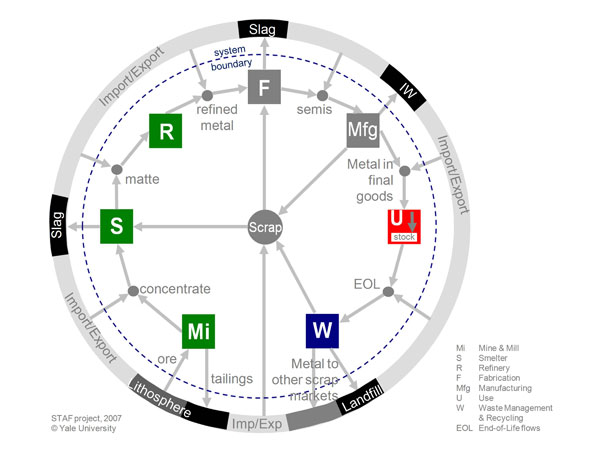It looks like you're using an Ad Blocker.
Please white-list or disable AboveTopSecret.com in your ad-blocking tool.
Thank you.
Some features of ATS will be disabled while you continue to use an ad-blocker.
6
share:
Almost all lead is recycled, among the only elements on the periodic table to earn that distinction. With good reason, mind you: the soft metal is a potent neurotoxic known to impact children’s brain development, among other nasty health effects. Today, nearly all lead is used in batteries (though it was once put into gasoline, leading to widespread contamination, and, in places like Afghanistan, still is.) Most of this dangerous element is now endlessly cycled from battery to battery, thanks to stringent regulations (though enough of it ends up being improperly recycled to constitute one of the world’s worst pollution problems.)
In principle, all metals are infinitely recycleable and could exist in a closed loop system, note the authors of a survey of the metals recycling field published in Science on August 10. There’s a benefit too, because recycling is typically more energy-efficient than mining and refining raw ore for virgin materials. Estimates vary but mining and refining can require as much as 20 times the amount of energy as recycling a given material. Think about it: a vast amount of energy, technology, human labor and time are expended to get various elements out of the ground—and then that element is often discarded after a single use.

Continued at: scientific american.com
This is a very interesting read.
Basically what this article is getting at is that recycling works, but not as good as you might think. Also we’ll have to learn to reuse all the elements of the periodic table, or we’ll lose elements to use. This could lead to a very serous problem in the future if we don't start to figure out new ways to make recycling more efficient.
One day hopefully we can mine all the land fills for raw materials. I wonder why this hasn't been expioted yet.
I'm sure thiers money in it some how. The amount of metals and chemicals that could seperated in all the land fills in the U.S. alone could be worth 100's of billions.
I'm sure thiers money in it some how. The amount of metals and chemicals that could seperated in all the land fills in the U.S. alone could be worth 100's of billions.
edit on 11-8-2012 by Th3MissingLink because: (no reason given)
Originally posted by Th3MissingLink
One day hopefully we can mine all the land fills for raw materials. I wonder why this hasn't been expioted yet.
I'm sure thiers money in it some how. The amount of metals and chemicals that could seperated in all the land fills in the U.S. alone could be worth 100's of billions.
edit on 11-8-2012 by Th3MissingLink because: (no reason given)
Actually the EPA has been harvesting Landfill Methane. Sounds like a good plan.
Landfill Methane Outreach Program
Everyone thinks I'm nuts when I say this, but there is on thing that I can think of that doesn't get recycled, and I know how to do it.
Cigarette Butts.......
They can be broke down and turned into a liquid with a chemical I know of, sprayed into heated molds, and compressed into any form you want or need. Something like this would be good for making car parts and such.
It can be done.
Cigarette Butts.......
They can be broke down and turned into a liquid with a chemical I know of, sprayed into heated molds, and compressed into any form you want or need. Something like this would be good for making car parts and such.
It can be done.
new topics
-
President-Elect TRUMP Picks Former Florida A.G. PAM BONDI to be U.S. Attorney General.
2024 Elections: 3 hours ago -
A Mysterious Orb filmed over NYC by local news
Aliens and UFOs: 4 hours ago -
Putin will warn civilians in targeted areas
World War Three: 5 hours ago -
The Popular Vote does not matter
Political Issues: 7 hours ago -
Gaetz withdraws from attorney general consideration
US Political Madness: 10 hours ago -
Bridgewater Triangle
General Chit Chat: 10 hours ago -
Is Russia Using a New Type of Beam Weapon Against Ukraine?
Weaponry: 11 hours ago
top topics
-
Well we know Putins ICBMs won't fail in their silos
World War Three: 15 hours ago, 13 flags -
International Criminal Court Issues Arrest Warrant For Netanyahu
Mainstream News: 13 hours ago, 13 flags -
Gaetz withdraws from attorney general consideration
US Political Madness: 10 hours ago, 12 flags -
Is Russia Using a New Type of Beam Weapon Against Ukraine?
Weaponry: 11 hours ago, 11 flags -
Putin will warn civilians in targeted areas
World War Three: 5 hours ago, 10 flags -
President-Elect TRUMP Picks Former Florida A.G. PAM BONDI to be U.S. Attorney General.
2024 Elections: 3 hours ago, 10 flags -
racist rant, but she made the arguement to get rid of DEI
US Political Madness: 15 hours ago, 10 flags -
The Popular Vote does not matter
Political Issues: 7 hours ago, 8 flags -
Bridgewater Triangle
General Chit Chat: 10 hours ago, 7 flags -
Here is why Western leaders in NATO have zero fear of nuclear warfare. At all. Zero.
World War Three: 13 hours ago, 6 flags
6
